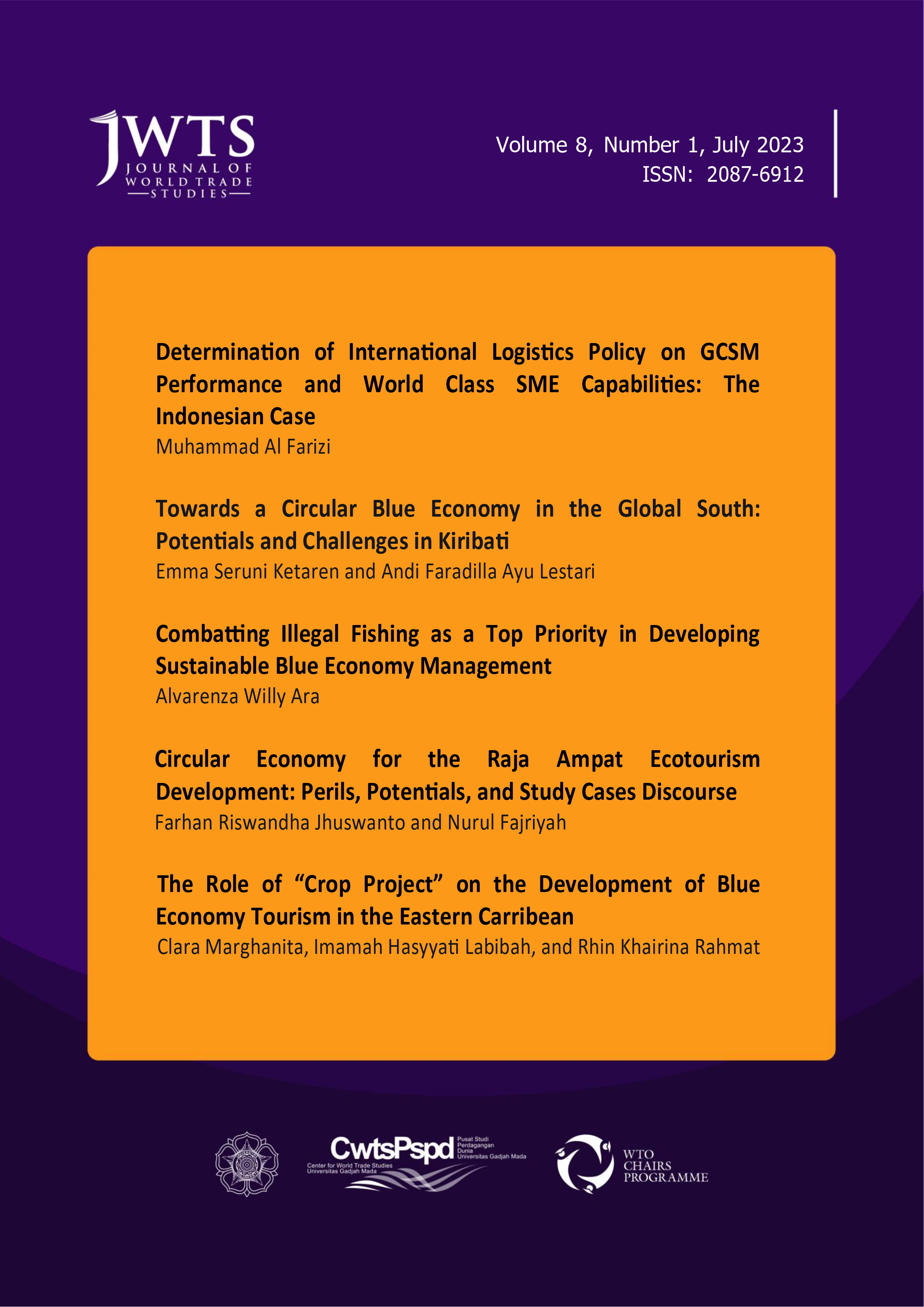Abstract
Despite its marine diversity and tourism potential, the Caribbean is highly vulnerable to climate change, natural disasters, and damage from human activities. In response, Caribbean governments are actively implementing the Blue Economy framework and the Eastern Caribbean Regional Ocean Policy (ECROP), with support from the World Bank. The World Bank has launched the Caribbean Regional Oceanscape Project (CROP) to drive sustainable development of marine resources in the Eastern Caribbean. This study focuses on assessing CROP's impact on the Eastern Caribbean's Blue Economy, particularly in the tourism sector. The analysis of literature, databases, and agency reports pertaining to the Eastern Caribbean reveals two key findings. First, governments have adopted the Blue Economy as a central strategy to bolster regional fiscal and financial resilience through ECROP policies. Second, despite ECROP's success in increasing economic potential, there are policy imbalances in the various regions due to uneven regulation of the green industry sector. This can be seen in policies in some Eastern Caribbean regions that override the protection of marine ecosystems in favor of achieving state profits in tourism. To encourage the tourism sector as a driver of sustainable development in this region, countries must shift their governance towards more equitable industry regulation, ensure fair access, and prioritize coastal ecological sustainability.
References
Acevedo, S., LaFramboise, N., & Wong, J. (2017). Chapter 3. Caribbean Tourism in the Global Marketplace: Trends, Drivers, and Challenges. In Unleashing Growth and Strengthening Resilience in the Caribbean (p. 39). International Monetary Fund. https://doi.org/10.5089/9781484315194.071
Alleyne, D. (2023). Studies and Perspectives Series- ECLAC Subregional Headquarters for the Caribbean (115th ed.). Economic Commission for Latin America and the Caribbean (ECLAC). https://repositorio.cepal.org/server/api/core/bitstreams/7599068a-c82e-4dbd-84af-ead0f71662a8/content
Barne, D. (2019, June 10). Caribbean Beaches are Littered with Single-Use Plastics. World Bank Blogs. https://blogs.worldbank.org/opendata/caribbean-beaches-are-littered-single-use-plastics
CARCEP. (2017). Impacts of Climate Change on Tourism in the Coastal and Marine Environments of Caribbean Small Island Developing States (SIDS). Impacts of Climate Change on Tourism in the Coastal and Marine Environments of Caribbean Small Island Developing States (SIDS), 174-184, 180. https://assets.publishing.service.gov.uk/media/5a82a85840f0b6230269c051/12._Tourism.pd
CARSEA. (2007). CARSEA. Caribbean Sea Ecosystem Assessment (CARSEA), VII(Blue Economy), 12-20. https://www.cbd.int/doc/meetings/mar/rwebsa-wcar-01/other/rwebsa-wcar-01-crfm-03-en.pdf
Department of Sustainable Development. (2023). Saint Lucia’s National Ocean Policy and Strategic Action Plan (NOP SAP) 2020–2035. Department of Sustainable Development.
Draft for Client Acceptance OECS. (2021). Saint Lucia Coastal Master and Marine Spatial Plan Draft for Client Acceptance. Organization of Eastern Caribbean States.
Eastern Caribbean Central Bank. (2022). Saint Lucia Annual Economic and Financial Review - 2022. Eastern Caribbean Central Bank.
Eastern Caribbean Central Bank. (2023). St. Kitts & Nevis. Tourism Analytics. https://tourismanalytics.com/st-kitts--nevis.html
Hammer, J., & Pivo, G. (2016). The Triple Bottom Line and Sustainable Economic Development Theory and Practice. Economic Development Quarterly, 31, 25-36. 10.1177/0891242416674808
McKenzie, D., & Van Steen, M. (2024). Zero Waste in the Caribbean: New Ways, New Waves. UNEP. Retrieved February 25, 2025, from https://www.unep.org/zero-waste-caribbean-new-ways-new-waves
OCHA. (2017). A Caribbean Strategy to Cope with Climate Change. Retrieved February 25, 2025, from https://reliefweb.int/report/jamaica/caribbean-strategy-cope-climate-change
OECD. (2021, December 2). “Special Feature: The Caribbean”, in Latin American Economic Outlook 2021: Working Together for a Better Recovery. OECD Publishing, 229-239. https://doi.org/10.1787/5fedabe5-en
OECS. (2013). Eastern Caribbean Regional Ocean Policy. OECS Secretaria. file:///Users/user/Downloads/OECS_Eastern_Caribbean_Ocean_Policy_2013%20(1).pdf
Organization of Eastern Caribbean States. (2020). “We Are Large Ocean States”: Blue economy and ocean governance in the Eastern Caribbean. OECS Commission, Morne Fortune, Castries, Saint Lucia. Caribbean Regional Oceanscape Project, OECS Commission.
Reeves, S., Albert, M., Kuper, A., & Hodges, B. D. (2008). Why Use Theories in Qualitative Research? The BMJ. Retrieved November 19, 2023, from https://www.bmj.com/content/337/bmj.a949
Robert, D. J. (2022). The Blue Economy: From Concept to Reality in the Caribbean Region. G20 Development.
Saint Lucia Tourism Authority. (2023). Saint Lucia. Tourism Analytics. https://tourismanalytics.com/saint-lucia.html
Sinha, S. (2015, October 1). The Exploration–Exploitation Dilemma: A Review in the Context of Managing Growth of New Ventures. Vikalpa: The Journal for Decision Makers, 40(3), 3130323. https://doi.org/10.1177/0256090915599709
The Organization of Eastern Caribbean States (OECS). (2020, February). Mid Semester Report Caribbean Region Ocean Project (CROP).
UNEP. (2023). Zero Waste in the Caribbean: New Ways, New Waves. UNEP. https://www.unep.org/zero-waste-caribbean-new-ways-new-waves
United Nation. (2011). The Economics of Climate Change in the Caribbean. United Nation. https://repositorio.cepal.org/server/api/core/bitstreams/69703e8c-fc31-40f9-96ff-168035f12eb9/content
World Bank. (2017). The Potential of the Blue Economy: Increasing Long-Term Benefits of the Sustainable Use of Marine Resources for Small Island Developing States and Coastal Least Developed Countries. World Bank. https://sustainabledevelopment.un.org/content/documents/15434Blue_EconomyJun1.pdf
World Bank. (2019). Marine Pollution in the Caribbean; Not a Minute to Waste. Marine Pollution in the Caribbean; Not a Minutes to Waste, (VII), 2-4.

This work is licensed under a Creative Commons Attribution-NonCommercial-ShareAlike 4.0 International License.

